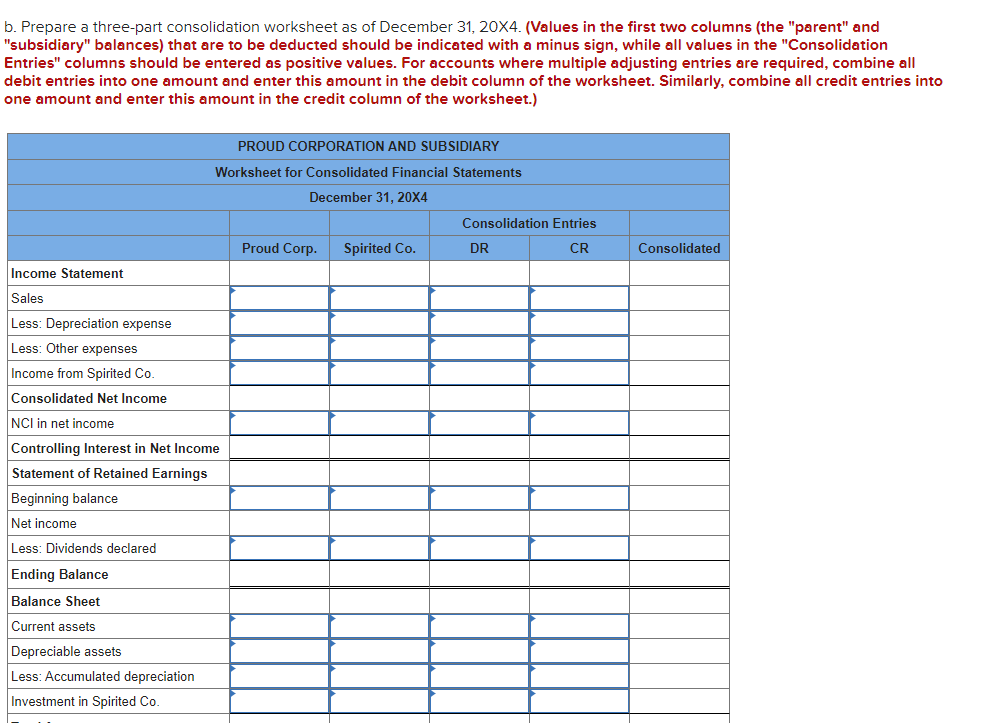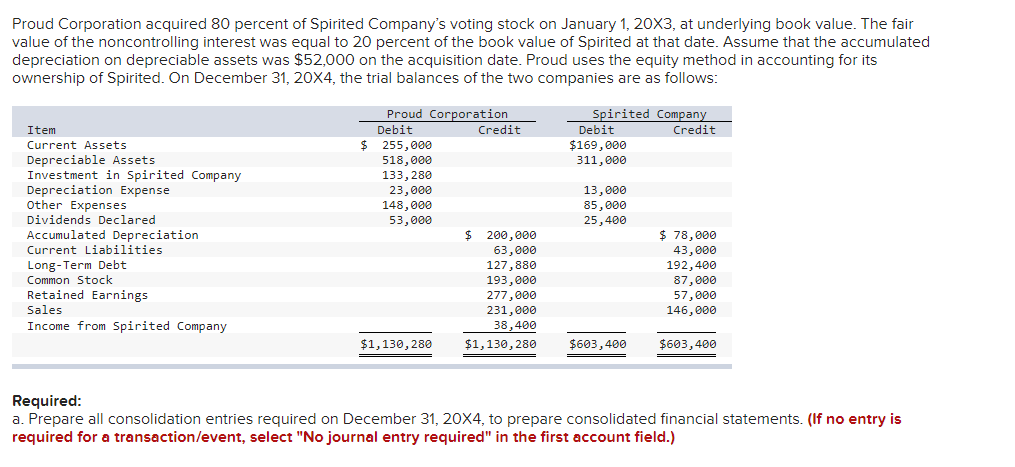Proud Corporation acquired 80 percent of Spirited Company's voting stock on January 1, 20X3, at underlying book value. The fair value of the noncontrolling interest was equal to 20 percent of the book value of Spirited at that date. Assume that the accumulated depreciation on depreciable assets was $52,000 on the acquisition date. Proud uses the equity method in accounting for its ownership of Spirited. On December 31, 20X4, the trial balances of the two companies are as follows: Item Current Assets Depreciable Assets Investment in Spirited Company Depreciation Expense Other Expenses Dividends Declared Accumulated Depreciation Current Liabilities Long-Term Debt Common Stock Retained Earnings Sales Income from Spirited Company Proud Corporation Debit $ 255,000 518,000 133,280 23,000 148,000 53,000 Credit $ 200,000 63,000 127,880 193,000 277,000 231,000 38,400 $1,130,280 $1,130,280 Spirited Company Credit Debit $169,000 311,000 13,000 85,000 25,400 $ 78,000 43,000 192,400 87,000 57,000 146,000 $603,400 $603,400 Required: a. Prepare all consolidation entries required on December 31, 20X4, to prepare consolidated financial statements. (If no entry is
Proud Corporation acquired 80 percent of Spirited Company's voting stock on January 1, 20X3, at underlying book value. The fair value of the noncontrolling interest was equal to 20 percent of the book value of Spirited at that date. Assume that the accumulated depreciation on depreciable assets was $52,000 on the acquisition date. Proud uses the equity method in accounting for its ownership of Spirited. On December 31, 20X4, the trial balances of the two companies are as follows: Item Current Assets Depreciable Assets Investment in Spirited Company Depreciation Expense Other Expenses Dividends Declared Accumulated Depreciation Current Liabilities Long-Term Debt Common Stock Retained Earnings Sales Income from Spirited Company Proud Corporation Debit $ 255,000 518,000 133,280 23,000 148,000 53,000 Credit $ 200,000 63,000 127,880 193,000 277,000 231,000 38,400 $1,130,280 $1,130,280 Spirited Company Credit Debit $169,000 311,000 13,000 85,000 25,400 $ 78,000 43,000 192,400 87,000 57,000 146,000 $603,400 $603,400 Required: a. Prepare all consolidation entries required on December 31, 20X4, to prepare consolidated financial statements. (If no entry is
Chapter8: Consolidated Tax Returns
Section: Chapter Questions
Problem 25CE
Related questions
Question

Transcribed Image Text:b. Prepare a three-part consolidation worksheet as of December 31, 20X4. (Values in the first two columns (the "parent" and
"subsidiary" balances) that are to be deducted should be indicated with a minus sign, while all values in the "Consolidation
Entries" columns should be entered as positive values. For accounts where multiple adjusting entries are required, combine all
debit entries into one amount and enter this amount in the debit column of the worksheet. Similarly, combine all credit entries into
one amount and enter this amount in the credit column of the worksheet.)
PROUD CORPORATION AND SUBSIDIARY
Worksheet for Consolidated Financial Statements
December 31, 20X4
Income Statement
Sales
Less: Depreciation expense
Less: Other expenses
Income from Spirited Co.
Consolidated Net Income
NCI in net income
Controlling Interest in Net Income
Statement of Retained Earnings
Beginning balance
Net income
Less: Dividends declared
Ending Balance
Balance Sheet
Current assets
Depreciable assets
Less: Accumulated depreciation
Investment in Spirited Co.
Proud Corp. Spirited Co.
Consolidation Entries
CR
DR
Consolidated

Transcribed Image Text:Proud Corporation acquired 80 percent of Spirited Company's voting stock on January 1, 20X3, at underlying book value. The fair
value of the noncontrolling interest was equal to 20 percent of the book value of Spirited at that date. Assume that the accumulated
depreciation on depreciable assets was $52,000 on the acquisition date. Proud uses the equity method in accounting for its
ownership of Spirited. On December 31, 20X4, the trial balances of the two companies are as follows:
Item
Current Assets
Depreciable Assets
Investment in Spirited Company
Depreciation Expense
Other Expenses
Dividends Declared
Accumulated Depreciation
Current Liabilities
Long-Term Debt
Common Stock
Retained Earnings
Sales
Income from Spirited Company
$
Proud Corporation
Debit
255,000
518,000
133,280
23,000
148,000
53,000
Credit
$ 200,000
63,000
127,880
193,000
277,000
231,000
38,400
$1,130,280 $1,130,280
Spirited Company
Credit
Debit
$169,000
311,000
13,000
85,000
25,400
$603,400
$ 78,000
43,000
192,400
87,000
57,000
146,000
$603,400
Required:
a. Prepare all consolidation entries required on December 31, 20X4, to prepare consolidated financial statements. (If no entry is
required for a transaction/event, select "No journal entry required" in the first account field.)
Expert Solution
This question has been solved!
Explore an expertly crafted, step-by-step solution for a thorough understanding of key concepts.
This is a popular solution!
Trending now
This is a popular solution!
Step by step
Solved in 3 steps with 4 images

Knowledge Booster
Learn more about
Need a deep-dive on the concept behind this application? Look no further. Learn more about this topic, accounting and related others by exploring similar questions and additional content below.Recommended textbooks for you



Intermediate Accounting: Reporting And Analysis
Accounting
ISBN:
9781337788281
Author:
James M. Wahlen, Jefferson P. Jones, Donald Pagach
Publisher:
Cengage Learning



Intermediate Accounting: Reporting And Analysis
Accounting
ISBN:
9781337788281
Author:
James M. Wahlen, Jefferson P. Jones, Donald Pagach
Publisher:
Cengage Learning


